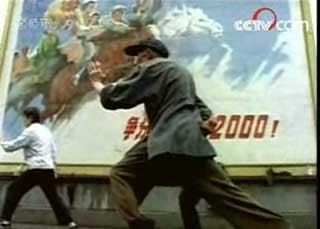Source: CCTV.com
02-29-2008 11:08
It was early autumn in 1981, and Katherine Flower, who worked for English learning programmes with the BBC, arrived in Beijing.
Katherine Flower, Presenter of Follow Me, said, "I arrived in Beijing in September 1981, the same month as my birthday. The weather was at its best then. Luckily I'd missed the hot summer. The sky was blue and the sun was shining, quite different from London. I remember getting up very early one morning and going to the Forbidden City on my "Flying Dove" bike. I saw people doing their slow taiji movements. The sun rose beside the Forbidden City, turning its walls red and its roofs gold. My first impression of China had been of a gloomy place, not very cheerful, because the people all dressed in blue, grey, black and green – other colours were very rare. At first, I thought it was a sad place. But once I'd started working here I began feeling more and more excited."
At the time, Follow Me, an English teaching programme produced by the BBC, was being promoted all over the world. Katherine, who had previously presented the French version, took over the Chinese version, working with China Central Television.
Xu Xiongxiong, Director of TV Education Department, CCTV, said, "CCTV only had 2 channels. They really only broadcast in the evenings. So the daytime was free to promote education."
From the beginning of 1982, Chinese viewers heard some familiar title music at 6:20 pm every Tuesday, Thursday and Saturday, and at 8:30 am every Sunday.
Li Peichun, Head of English Programmes of China Radio International, said, "When the titles ended, the well-known actor Francis Matthews – a real gentleman - would turn around and incline his head. It was as if he was saying: "Follow me, follow me." I thought that was pretty cool."
 |
Hu Wenzhong, the associate dean of the English Department at Beijing Foreign Studies University, was invited by China Central Television to partner Katherine Flower on Follow Me.
Hu Wenzhong, Presenter of Follow Me, said, "The morning after the first broadcast of Follow Me, I went to buy soybean milk and had my breakfast in the restaurant on the opposite side of the street. I was surprised by how many people in the restaurant kept looking at me. Only later did I realize it was because of the show the previous evening. That's how immediate its impact was."
At a time when TV sets were not so common, this was the first time many people had seen foreigners on television.
Soon after Follow Me began broadcasting, New Nation, a Singaporean magazine, carried a commentary. It read: "Currently in China, the most famous foreigner, or perhaps even the best-known foreigner for the whole 1980s, is not a world leader, or a sports superstar or a passionate artist, but a red-haired London girl with slow speech."
